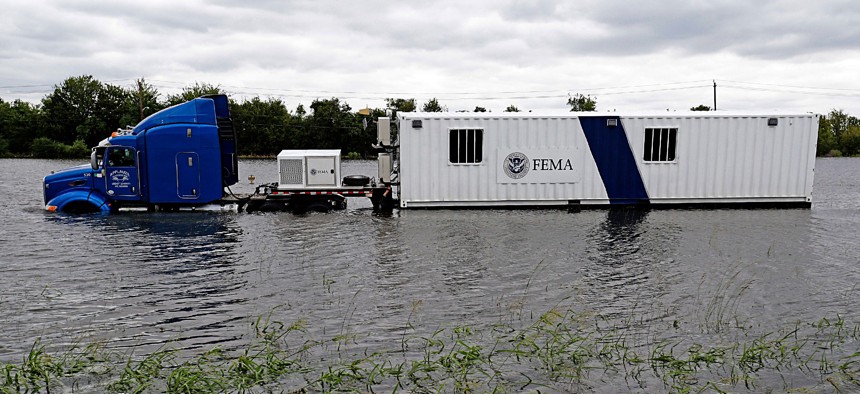
A flooded FEMA truck in Houston in the aftermath of Hurricane Harvey, Aug. 30, 2017 Thomas Shea/AFP via Getty Images
Data Collection Features in a New Bill Targeting Equity at FEMA
The Federal Emergency Management Advancement of Equity Act would instruct the disaster response to improve its data collection systems to help identify inequities in its distribution of federal assistance.
The chairman of the House Homeland Security Committee introduced a bill requiring the Federal Emergency Management Agency to improve its data collection systems as part of an effort to address long standing economic disparities in the government's response to disasters.
Rep. Bennie Thompson (D-Miss.) introduced the FEMA Equity Act with Val Demings (D-Fla.), last week. Sen. Elizabeth Warren also introduced an accompanying bill in the Senate co-sponsored by Sens. Cory Booker (D-N.J.) and Tammy Duckworth (D-Ill.).
"For too long, frontline communities have been disproportionately impacted by the devastating effects of natural disasters, and this injustice is exacerbated by the distribution of relief," Warren said in a statement.
The bill would instruct FEMA to develop and implement a new agency-wide process within one year which ensures equity in its distribution of federal assistance, while working with the Department of Housing and Urban Development and Small Business Administration to identify data requirements to track and measure success.
The bill would also require the agency to modify its data collection systems as necessary to help identify FEMA policies or programs that hinder the equitable distribution of federal assistance in the wake of disasters.
The proposed legislation comes after the federal government released its first-ever equity action plans last month, a sweeping set of more than 300 concrete actions and strategies across agencies to improve equity in the federal government and its services and interactions with the public, as well as President Joe Biden's executive order on Advancing Racial Equity and Support for Underserved Communities Through the Federal Government. The order instructs agencies to "recognize and work to redress inequities in their policies and programs that serve as barriers to equal opportunity."
FEMA has also worked to improve its focus on equity in recent years, committing to "instilling equity as a foundation of emergency management" as the first goal in its strategic plan for 2022 through 2026.
The bill further directs FEMA to implement criteria meant to increase equity into all of its programs, including mitigation funding for disasters, support for local governments and individual housing assistance.
"Whether you receive assistance after a disaster shouldn't depend on your zip code or background," Rep. Thompson said in a statement. "It's past time that the federal government -– and particularly [FEMA] — makes disaster assistance equity a real priority to reduce barriers to recovery."
FEMA said it conducted its own analysis that found the agency disproportionately approved housing assistance to higher-income renters as compared to low-income renters, and that low-income survivors of disasters were less likely to receive federal assistance than the affluent. The new bill would direct the Government Accountability Office to assess FEMA requirements for authorizing the distribution of federal assistance and their impact on traditionally underserved communities.







